How Spam Won Over America's Restaurants
Originally marketed to American housewives as a no-fuss dinner alternative Spam now takes center stage in restaurants across the U.S.
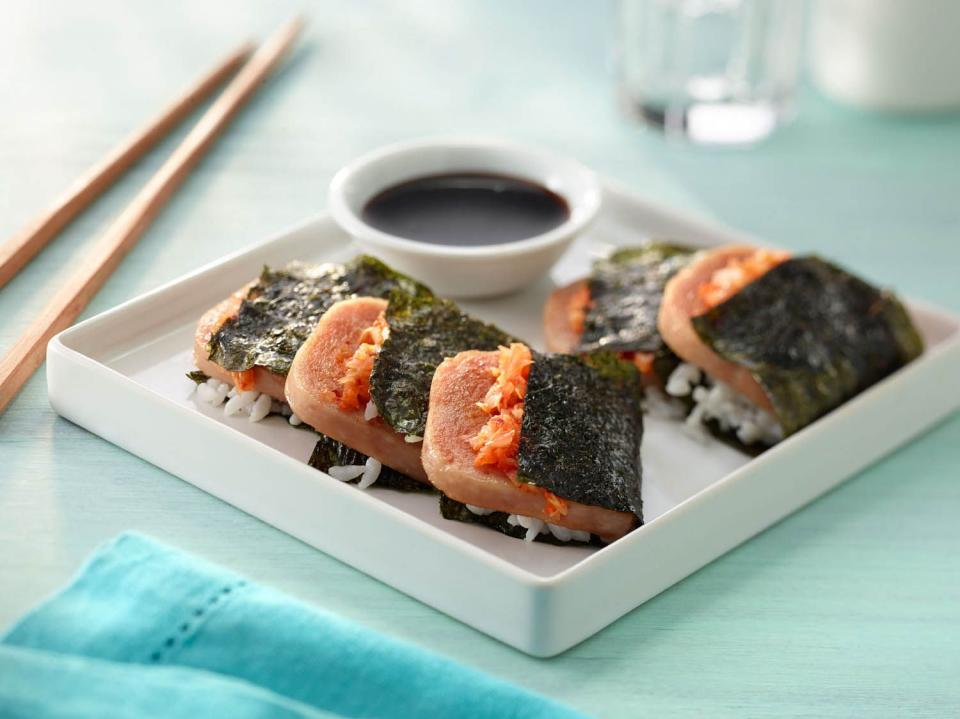
According to Carolyn Wyman, author of the indispensable Spam: A Biography, there are three characteristics that consistently create hotbeds of Hormel miracle-meat obsession. The first is a current or former U.S. military presence, as the (pretty much) non-perishable product has played a huge role in feeding our armed forces. The second is extreme weather, hot or cold—ideal for that unflappable shelf life. The third: a natural predilection for pork.
Areas of the world that see these factors overlap—Hawaii, Guam, Alaska, South Korea, the Philippines—have become central hubs of international Spamdom, cultivating generation after generation of lifelong devotees (see: Spam Cognition Theory). And some of these outspoken fans, naturally, have married their unironic fondness for six-sided spiced pork shoulder with positions in the kitchen, fostering an unlikely and exuberant relationship between tinned supermarket meat and the realm of restaurants.
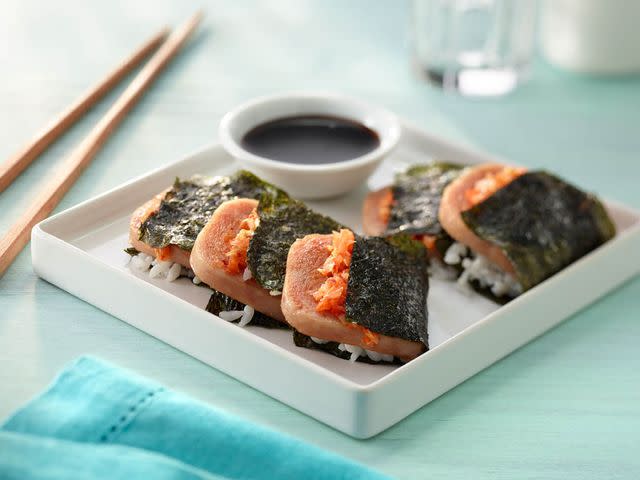
Originally marketed to American housewives as a no-fuss dinner alternative—"Tastes fine, saves time!" went an early radio jingle—Spam, introduced in 1937, has always held a close association with the home. And it's the dinner table where those indoctrinated into the club early established their lasting Spam loyalty, particularly strong among the children of Asian immigrants.
"It's something I grew up with, and the taste is homey and calming to me," says Cristina Quackenbush, the Filipino-American chef/owner of New Orleans' Milkfish, where diced Spam comes mixed into an egg-topped fried rice. "I make no excuses for it. I love it. It's part of Filipino culture. I don't eat processed food. But I do eat Spam."
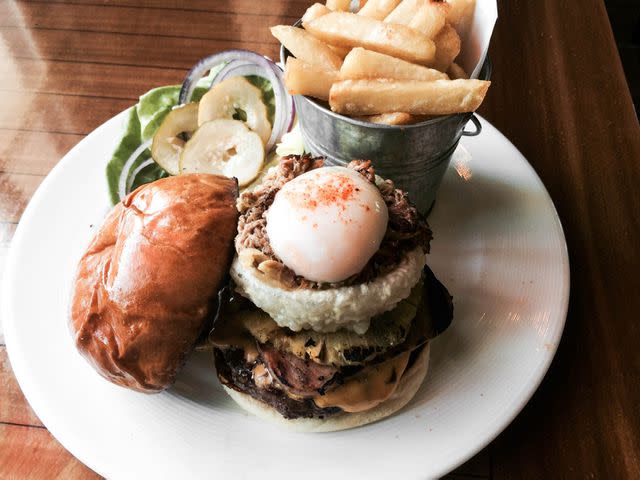
"It's taken on this mysticism," says chef Robert Lam, who grew up in a Vietnamese community in Southern California and now owns Butterfly, in San Francisco. Here, Spam meets Thai black sticky rice atop a variation on the Loco Moco burger; it also gets microplaned over Japanese-inspired tater tots. "There's a comfort to it. You want a hot dog, you don't want saucisson."
"It's an emotional connection," says Jennifer Yee, owner of Aloha Café, a Hawaiian restaurant in L.A.'s Little Tokyo, where grilled Spam slices are a breakfast-platter staple. (Nearby, Roy Choi's Chego! takes things in a Korean direction, pairing seared Spam with buttered kimchi in a rice bowl.) "You associate Hawaii with Spam."
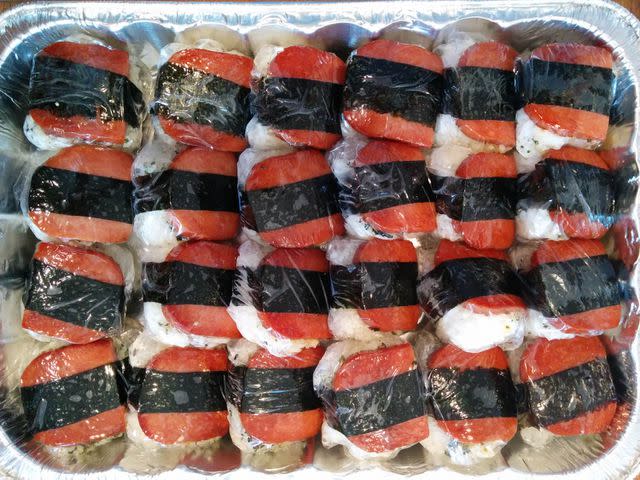
Serious Eats / Kiki Aranita
That 50th-state-pride sentiment is shared by Crystalyn Costa of Brooklyn's Onomea, which counts Spam musubi, the cultish snack wrapping Spam and sticky rice together in nori, among its top sellers. They're an equally big hit for the Poi Dog food cart in Philadelphia, which augments musubi with unorthodox additions like shiso and guava preserves.
"You can't have a Hawaiian restaurant without having Spam. That's just impossible to do," says Costa, originally from Hilo on the Big Island. "We made the decision that we were going to serve it, even if people think it's weird."
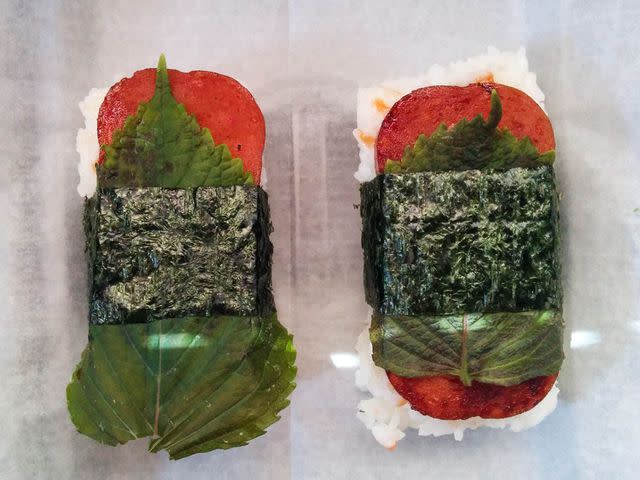
Serious Eats / Kiki Aranita
Such uneasiness, Spam advocates believe, stems from unfamiliarity with the product, plus preconceived ideas of what it represents. "The most common thing non-Filipinos ask is 'Why are you guys eating mystery meat?'" says Nicole Ponseca of New York's Filipino restaurant Maharlika, home of Spam fries coated in San Miguel beer batter. "I always say, 'Why do you eat bologna or mortadella?'" (For the record: Spam is composed of pork shoulder, ham, salt, water, potato starch, sugar, and sodium nitrite.)
"Some people are very turned off by it," says Yee. "Canned meat is weird in general to them." The fact that it comes hermetically sealed has contributed to the perception that of Spam as commodity meat, while chefs wrangling with order sheets will tell you the exact opposite.
"People call it a poor man's food, but it's not really," says Quackenbush. "It's expensive." Twelve-ounce cans often exceed $4 a pop in groceries; Lam estimates that he spends roughly the same amount of per-pound dough on Spam that he does on beef short ribs.

Spam fanaticism, both in and out of the kitchen, isn't quite as palpable in Minnesota, the birthplace of Spam, at least according to Jeremy Woerner of St. Paul's Blue Door Pub. "I wouldn't really call it a source of pride or anything," says Woerner, who regardless has had success with "Spam Bites," chunks rolled with cream cheese and pickles, then breaded and deep-fried. "There's a certain diehard group that thinks it's the greatest appetizer they've ever had."
It's also taken on a level of postmodern appeal in Portland, Oregon, where Brunch Box proudly throws Spam onto popular burgers like the "OMG" (beef, bacon, ham, Spam, American, fried egg) and the "5-Oh" (a patty topped with Spam, grilled pineapple and Swiss). "People are always selling the idea of Portland being different in all kinds of ways, and Spam is something that fits into that," says manager Jonathan Baldari.
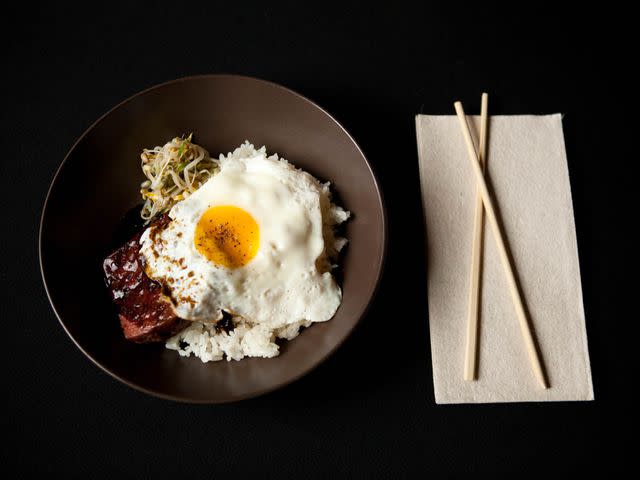
But while the novelty of Spam may jive with the intentional quirkiness some owners seek, a more glaring question remains—how do quality-fixated chefs and restaurateurs, in today's age of back-to-basics, farm-to-table cooking, justify working an unapologetically pre-fab product like Spam onto their menus? You could make like Greg Dunmore of NoJo in San Francisco, who goes through the trouble of making his own from scratch. (Yelpers have complained that they wish he'd use storebought.) Or, you could make like chefs like Lam, and declare an open exception to your own culinary ethos.
"I follow the traditions of sustainability and seasonality, says Lam. "I support that stuff. But look, I also support delicious. It's okay to cheat a little bit."

